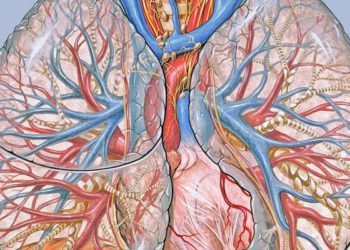Added sugar intake associated with mortality from cardiovascular disease
Image: CC/Wiki
1. Subjects who had the greatest intake of added sugar as a total percentage of their daily calories were more likely to die from cardiovascular disease (CVD).
2. Regular consumption of sugar-sweetened beverages (seven servings or more per week) is also associated with a higher risk of CVD mortality.
Evidence grade: Level 2 (Good)
Study Rundown: The amount of calories from added sugar that most Americans consume has been a cause for concern because of its link to negative health outcomes, especially CVD. However, there is no consensus regarding a “safe” percentage of calories that come from added sugar – the Institute of Medicine recommends no more than 25%, whereas the World Health Organization recommends no more than 10%.
This study was designed to examine consumption of added sugar as a percentage of total daily calories in a nationally representative sample and its relationship to CVD mortality. The study found that compared to participants who consumed about 8% of total calories from added sugar, those who consumed closer to 20% of calories from added sugar had a significantly higher risk of CVD disease. The study also found that those who consumed seven or more sugar-sweetened beverages per week were more likely to suffer CVD mortality compared to those who consumed just one serving or less per week.
The strengths of this study include the large number of participants going through a well-validated interview process for data collection. The investigators also accounted for a large number of potentially confounding variables and adjusted for them in the analysis to determine if added sugar was an independent risk factor for CVD mortality. However, the investigators determined the added sugar consumption at specific time periods in the lives of the participants and did not account for the changes in the dietary habits from the time of survey. They also used a modeling technique to calculate average daily added sugar intake from the survey answers obtained from the participants. While this technique is validated, it does introduce additional uncertainty about the actual quantity of added sugar consumed. The investigators relied on medical record coding to determine whether CVD was the cause of death, which also can introduce uncertainty.
Click to read the study, published today in JAMA Internal Medicine
Relevant Reading: A randomized trial of sugar-sweetened beverages and adolescent body weight
In-Depth [prospective cohort study]: The study consisted of participants of the National Health and Nutrition Examination Survey (NHANES) III Linked Mortality cohort, and data was collected from 1988-2006. A total of 11,733 participants were included in the study. The survey found that just under three-fourths of adults consumed 10% or more of daily calories from added sugar. During the median follow up of 14.6 years, they had 831 CVD deaths documents during 163,039 person-years. After adjusting for a number of variables, including demographic and lifestyle variables, the HRs across the quintiles of the percentage of daily calories consumed from added sugar were: 1.07 (95% CI, 1.02-1.12), 1.18 (1.06-1.31), 1.38 (1.11-1.70), and 2.03 (1.26-3.27; P=0.004). Adjusted HRs for those consuming 10-24.9% and >25% of calories from added sugar were, respectively, 1.3 (95% CI, 1.09-1.55) and 2.75 (1.40-5.42; P=0.004).
©2012-2014 2minutemedicine.com. All rights reserved. No works may be reproduced without expressed written consent from 2minutemedicine.com. Disclaimer: We present factual information directly from peer reviewed medical journals. No post should be construed as medical advice and is not intended as such by the authors, editors, staff or by 2minutemedicine.com. PLEASE SEE A HEALTHCARE PROVIDER IN YOUR AREA IF YOU SEEK MEDICAL ADVICE OF ANY SORT.







